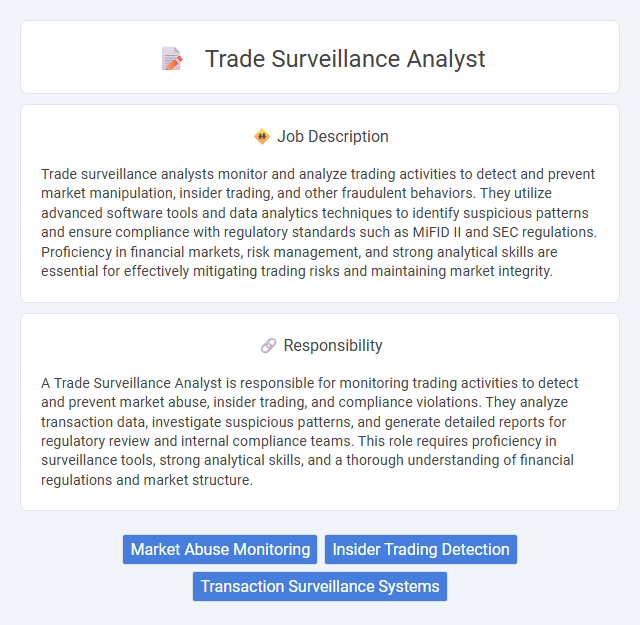
Trade surveillance analysts monitor and analyze trading activities to detect and prevent market manipulation, insider trading, and other fraudulent behaviors. They utilize advanced software tools and data analytics techniques to identify suspicious patterns and ensure compliance with regulatory standards such as MiFID II and SEC regulations. Proficiency in financial markets, risk management, and strong analytical skills are essential for effectively mitigating trading risks and maintaining market integrity.
Individuals with strong analytical skills and attention to detail are likely to be well-suited for a Trade Surveillance Analyst role, as the job involves monitoring trading activities for compliance and detecting potential risks. Those comfortable working with large datasets and regulatory frameworks may find this position aligns with their strengths. Candidates who thrive in fast-paced environments and have a keen understanding of financial markets are probably more likely to succeed in this career.
Qualification
Trade surveillance analysts require strong analytical skills, proficiency in financial regulations such as SEC and FINRA rules, and experience with surveillance software like Actimize or NICE. A background in finance, economics, or computer science combined with certifications like CAMS or CFA enhances job performance. Expertise in detecting market manipulation, fraud patterns, and compliance breaches is essential for effective risk mitigation.
Responsibility
A Trade Surveillance Analyst is responsible for monitoring trading activities to detect and prevent market abuse, insider trading, and compliance violations. They analyze transaction data, investigate suspicious patterns, and generate detailed reports for regulatory review and internal compliance teams. This role requires proficiency in surveillance tools, strong analytical skills, and a thorough understanding of financial regulations and market structure.
Benefit
Trade surveillance analyst roles likely offer significant benefits such as enhanced risk management and compliance adherence, which can reduce the probability of regulatory penalties for financial institutions. The position may provide strong career development opportunities through exposure to advanced analytics and regulatory frameworks in the financial markets. Employees might also experience improved organizational efficiency by identifying suspicious trading activities early, potentially increasing overall market integrity and trust.
Challenge
Trade surveillance analyst roles likely involve navigating complex regulatory requirements and detecting sophisticated trading anomalies. The challenge may lie in managing vast datasets to identify subtle patterns that suggest market abuse or compliance breaches. Continuous adaptation to evolving market dynamics and technological advancements seems essential for effective surveillance.
Career Advancement
Trade surveillance analysts play a crucial role in monitoring trading activities to detect and prevent market abuse and regulatory violations, which enhances their expertise in compliance and risk management. Progression often leads to senior analyst positions, team leadership roles, or specialized compliance functions within financial institutions, increasing responsibility and influence on regulatory strategies. Mastery of advanced data analytics tools and regulatory knowledge significantly boosts career trajectory and opens opportunities in broader risk management or regulatory advisory sectors.
Key Terms
Market Abuse Monitoring
A Trade Surveillance Analyst specializing in Market Abuse Monitoring identifies and investigates suspicious trading activities to prevent manipulation, insider trading, and other forms of market abuse. They utilize advanced analytical tools and transaction monitoring systems to detect irregular patterns in trading data, ensuring compliance with regulatory requirements from authorities such as the SEC, FCA, and ESMA. Expertise in financial regulations, data analysis, and risk management is essential for effectively safeguarding market integrity and protecting investor interests.
Insider Trading Detection
Trade surveillance analysts specializing in insider trading detection utilize advanced algorithms and pattern recognition techniques to monitor trading activities for suspicious behavior indicative of non-public information misuse. They analyze large datasets, including order books, trade timestamps, and communication logs, to identify anomalies that may signal illegal insider trading. Their expertise supports regulatory compliance, mitigates financial risks, and protects market integrity by ensuring timely reporting and investigation of potential violations.
Transaction Surveillance Systems
Trade surveillance analysts utilize advanced Transaction Surveillance Systems (TSS) to monitor and detect suspicious trading activities, ensuring compliance with regulatory requirements such as MiFID II and SEC Rule 611. These systems leverage machine learning algorithms and real-time data feeds to identify anomalies, market abuse, and insider trading patterns across equities, fixed income, and derivatives markets. Experts in this role analyze alerts generated by TSS, collaborate with compliance teams, and create detailed reports to support investigations and mitigate financial risks.
 kuljobs.com
kuljobs.com